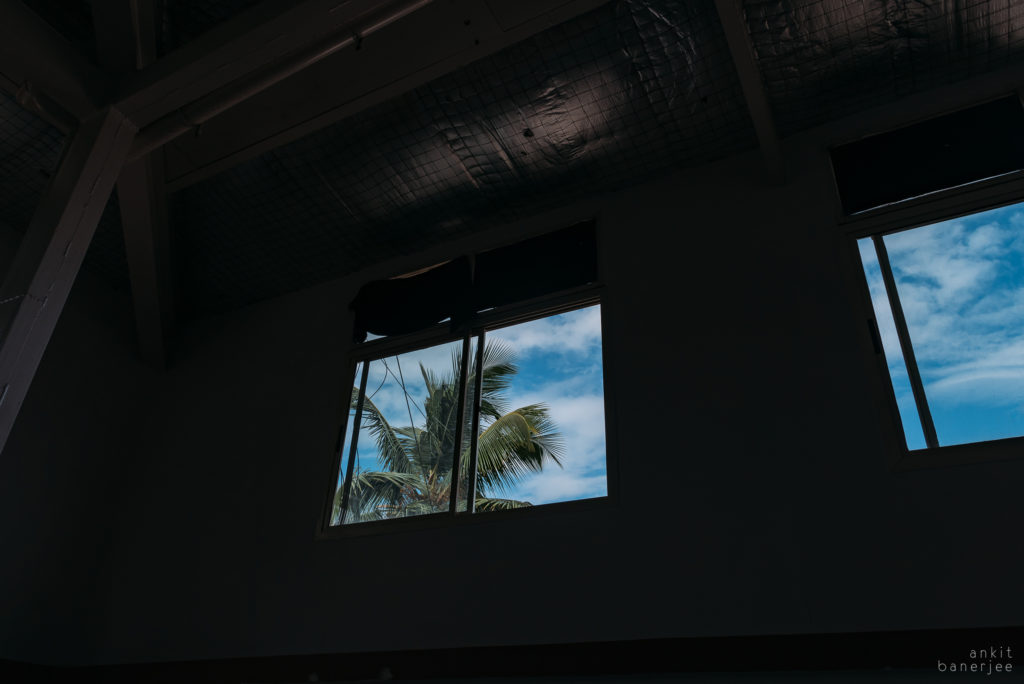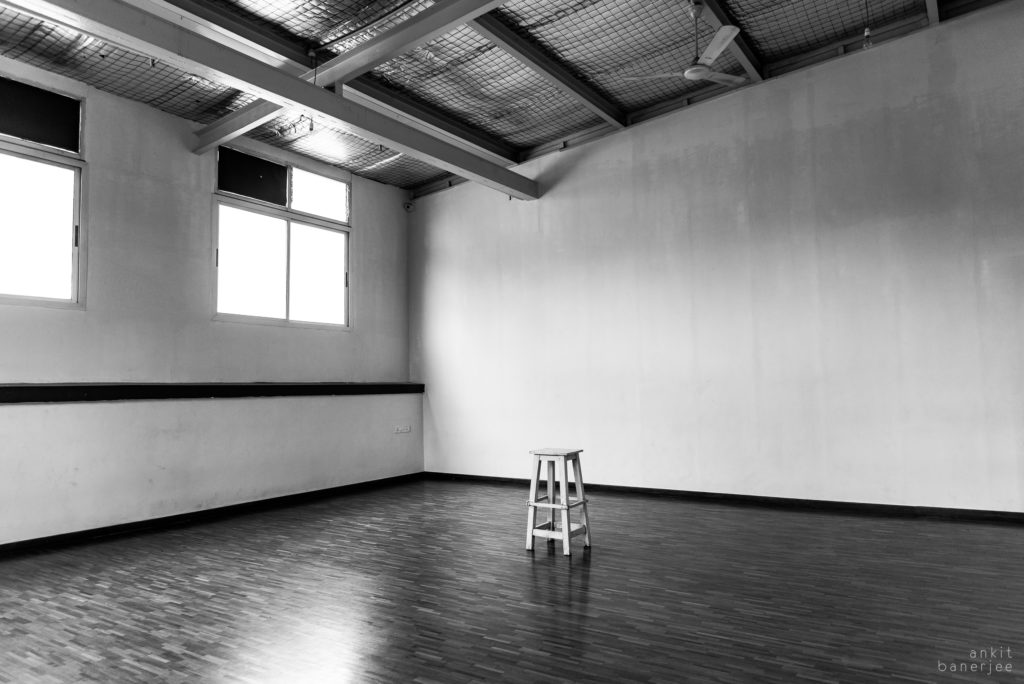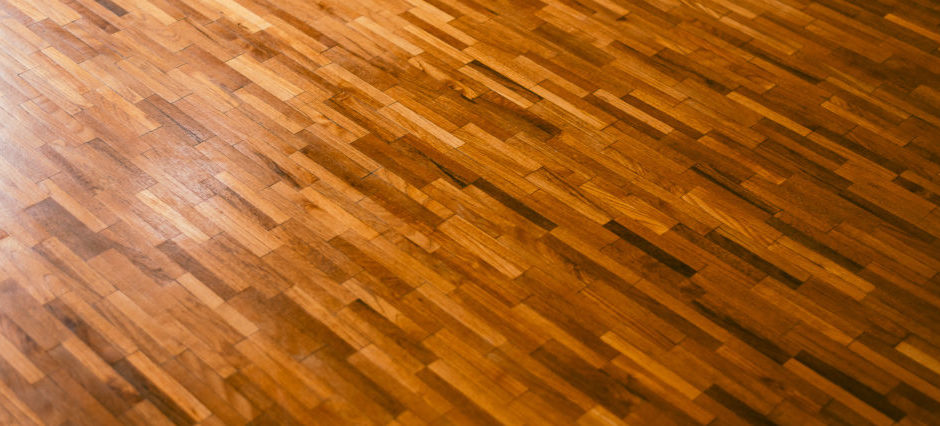This is a difficult piece to write.
I want to chronicle my relationship with Shoonya, the space the entity as it were, its people and its generous palms, carefully holding the artistic practices that several other artists — and myself — have shaped for themselves over the years. And yet, I don’t want to sound too hopeful: because I can’t separate this relationship from the reality of being a performing artist: that ever-elusive balance between making a living and growing as an artist exists in very real and sometimes debilitating ways.
But perhaps it is somewhere between these two polarities that this piece exists.
I’ve found it easier to be a theatre-maker and performer because of this space, and I’ve become a better one because of it too.
I dug out notes from the time I’ve been making work, doing workshops and training at Shoonya. Maybe they will fill this picture better, even if the colours are outside the lines and it’s a bit messy in general.
In August 2016, after I’d returned from a Playwrights’ Intensive at The John. F. Kennedy Centre for the Performing Arts, DC after having finished creating A Brief History of Your Hair (supported by India Foundation for the Arts, LshVa Studio, The New Voices Arts Project). I found that this work challenged me in ways that I found difficult to cope with.
There were existential questions: Should I make theatre at all? I should have been elated to have come back from such an interesting programme, but instead I felt inadequate and unable to move.
I entered the expanse of the studios with no plan, except that I wanted to create a work about gender and misogyny that would spark a conversation. Actually, I can articulate that only in hindsight; back then the idea was more nebulous than I could explain.

No Rest in the Kingdom (produced by Sandbox Collective, supported by Shoonya – Centre for Art and Somatic Practices) currently running — and performing internationally — was developed through this (I have to say it) depressing time.
Some of my notes through this time read like this.
I’ve filled in a few details and rewritten some parts, for the sake of understanding.
“ … perhaps this overrated idea of ennui is important to making something. I am lying doing on this floor and staring at the sky for the last hour. The sky is blue and the palms are gentle. Does my idea even warrant a residency?”
Another time:
“A bike with two young guys passed me by as I was entering Shoonya. It was a one-way, and yet they were going in the other direction, of course. One of them … he may have been about 15. He tugged at my hair, and when I turned to look at him, he slapped me. It was a surprisingly efficient slap for someone sitting on a bike. I wept in the parking lot, humiliated and angry, before I went up and tried to rehearse. He was 15! Was that the problem?
The Khwaab Sa gang (the team from a dance-theatre production rehearsing there) had found out about this at lunch, and they were all really sweet, hovering around me, trying to make me feel better. But I can’t reconcile the space between the rehearsal room and the parking lot even though they are in the same building.”
In 2017, as I continued to rehearse and perform the show, while also training in a bit of contemporary dance at Shoonya. Much to our relief, Satkar Upahar, a darshini opened up next door. It was where everyone flocked to after a class or between rehearsals.
I wrote, as I wait for a friend to join me for breakfast.
“There is a kind waiter here. We are often alone on this floor, and he brings coffee just before I finish eating. It’s always beautifully timed. After that he goes back to his chair, back to his phone but even if I just look in his direction, he knows and asks me what I want. He has a gentle and precise awareness, almost like a performer’s. I can’t say he smiles, but it’s the kind of desirable pleasantness strangers can often share.”
In the same year, as part of a team at Shoonya (with a dancer and an organisational academic) we were doing workshops using dance and theatre tools for better workplace experiences, especially for women. I wrote after an intense session:
“I won’t feel ashamed of being idealistic: we are enabling change, even if it is in a minute way. Diya, Anita and I, felt a perceptible shift in the room of women today. And it was the room that enabled this somehow, the physical studio – giving in every way. Everyone and everything here is trying every day.”
In November 2018, on the plane back from Uganda where we’d performed No Rest in the Kingdom at the Kampala International Theatre Festival I’d jotted down:
“I lost my voice towards the second show: a set back for a performer. Especially when you’re doing it solo. I thought about the time I was in rehearsal in the small studio, and I swear I thought the wall moved, I was that loud. I remember thinking: My voice has been so steady and supportive all these years, even when the body has revolted. I want to go back to the studio and have that feeling again.”
Just before that, when Shoonya supported the making of a new work, i am not here, designed as an 8-step guide in how to censor women’s writing, I had written something to this effect:
“Every improvisation has been fruitful in some way. It’s a nice coming together of things: the team, the space, Sarvesh’s lunch. Things seem to have come full circle actually: I started an experiment with No Rest here and I continue it with this work. I feel like the walls have witnessed that aimless performer watching the trees sway in the sun wondering what to do, but also the forming of a voice.”
One evening — it seems that the month was July 2018, but I can’t be sure, because I’d written this on a piece of paper — I wrote:
“It was pouring. And you (in this case me?) know how the rain sweeps into Shoonya. Sudeep and Santosh ran to close the windows. The excitement was just too much, because someone had seen hail! Dipankar, Diya, Rick, Jean, Thommen, Avinash, Nayantara… everyone was out in the foyer talking over the downpour. Maryamma was squealing in excitement the loudest. It was as if we were trying to keep the rain out and in at the same time. There’s an odd sense of belonging here and our biggest commitment was to the moment.”

By Deepika Arwind
Deepika Arwind is a theatre-maker, based in Bangalore, who works under the banner of The Lost Post Initiative, a fluid collective that collaborates with diverse artists. She has won, and been nominated for, several awards for her work.
Her current shows (touring internationally) include No Rest in the Kingdom (produced by Sandbox Collective and supported by Shoonya); and i am not here, designed as an 8-step guide in how to censor women’s writing (supported by the Goethe-Institut, MMB). She has been part of many international artist residencies and collaborations (Germany, France, USA) and is the author of the children’s book Sarayu (Le Cosmographe Éditions; 2018).
